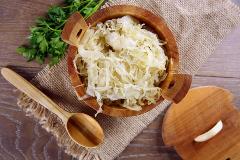Mar 9, 2018, 10:18
by
Sansum Clinic Registered Dietitian and Nutritionist, Christina Archer, MS, RD
Although research continues to evolve, consuming a variety of fermented foods is an excellent way to optimize your health.
Probiotics are live, active microorganisms ingested to alter the gastrointestinal flora for health benefits. They often are referred to as
“good” bacteria in the gut and compete with “bad” bacteria to either rid the body of pathogens or increase the immune system. Collectively this balance of good and bad bacteria is known as the “microbiome”. Different parts of the gastrointestinal tract have different types of beneficial bacteria present, based on the pH they are suited to survive in. In addition to the GI tract, our eyes, nasal cavity, and mouth have their own unique microbiome, too.

 Pictured: Left, sauerkraut; right, tempeh
Pictured: Left, sauerkraut; right, tempeh
Eating a well-balanced diet helps maintain the right balance of good and bad bacteria already present in your gut, but there are also certain foods you can eat to obtain beneficial bacteria. Those foods include
fermented vegetables, sauerkraut (
pictured below),
miso,
fermented cheese,
kefir,
yogurt,
tempeh (
pictured below),
pickles, kimchi, green olives, natto and
sourdough bread. Whole fermented foods offer other nutrients that are beneficial, too; calcium is present in fermented dairy products and tempeh is high in protein and fiber.
Although some manufacturers have begun adding probiotics to non-fermented grocery items such as water, protein powders, chips and juice, more research is needed to know whether or not they hold the same benefits as the whole food forms.
Bottom line: Although research continues to evolve, consuming a variety of fermented foods is an excellent way to optimize your health.